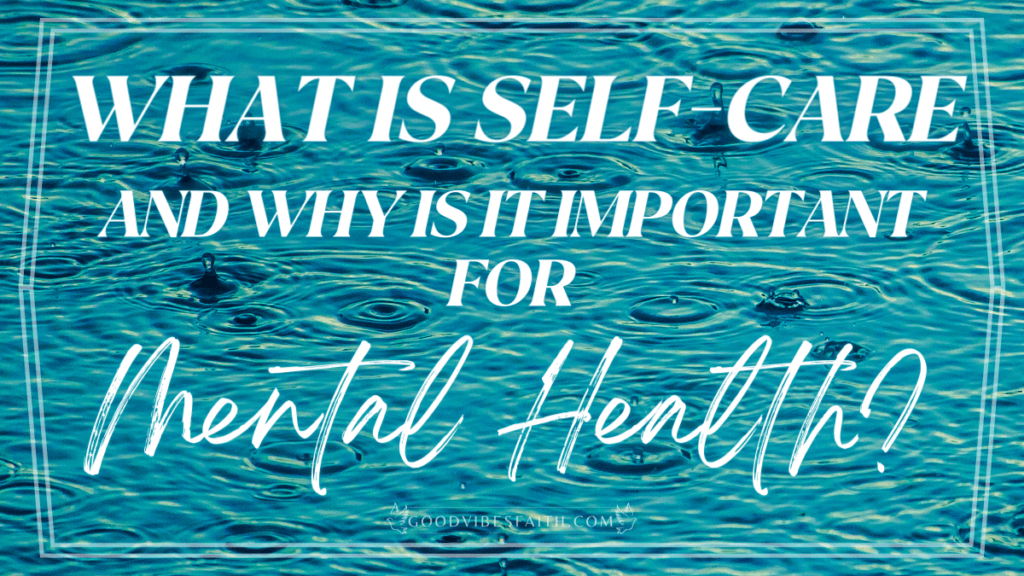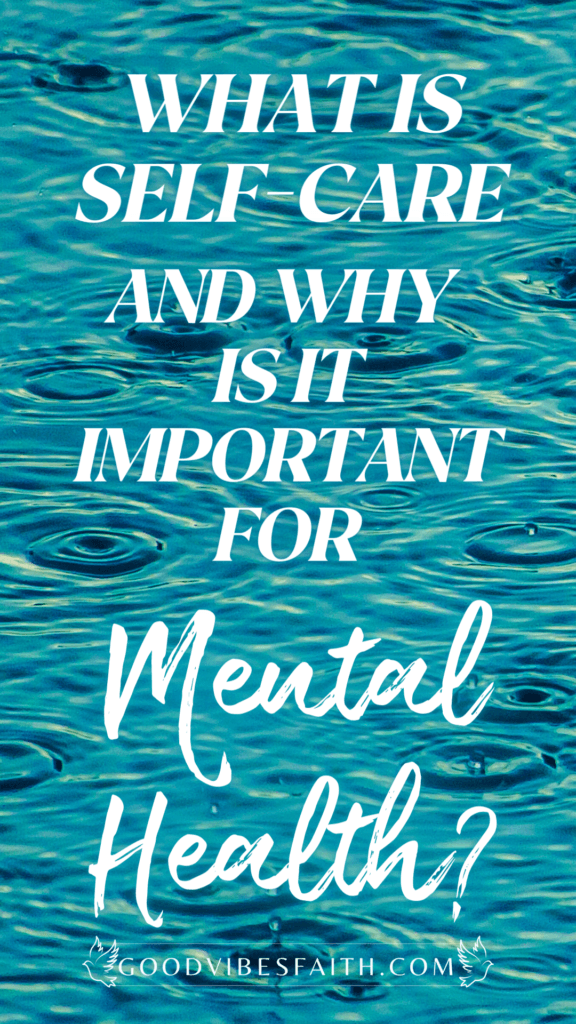What Is Self-Care And Why Is It Important For Mental Health?

Self-care is one of those things that we all know we should do, but sometimes it’s hard to fit into our busy lives. And even when we make time for it, we might not understand what it is and why it’s important. So today, let’s talk about self-care and why it matters for our mental health. We’ll explore the definition of self-care, discuss some of the benefits, and look at some examples of how you can add more self-care activities into your life. By the end of this post, you’ll have a better understanding of what self-care is and why it’s so crucial for maintaining a healthy mind and body. Are you ready? Let’s get started!
What is self-care and what are some of the benefits of practicing it regularly?
Self-care is any activity that we do deliberately to take care of our physical, mental, or emotional health. It can be something as simple as taking a break from work to go for a walk outside or taking a yoga class to relax and de-stress. It’s important to note that self-care is not the same as self-medication, which is using substances (like alcohol or drugs) to numb our feelings or escape from problems. Self-care is about proactive measures that we take to boost our mood, relieve stress, and improve our overall health.
Benefits of practicing self-care regularly
Some of the most notable benefits include:
Reduced stress and anxiety:
When we take time for self-care, we’re able to reduce the amount of stress and anxiety that we’re feeling. This can lead to improved mental well-being and a more positive outlook on life.
Improved physical health:
Taking care of our physical health is crucial for overall well-being. When we practice self-care, we’re more likely to eat healthy foods, exercise regularly, and get enough sleep. This can lead to improved physical health and a lower risk of developing chronic illnesses.
Greater happiness and satisfaction:
When we make time for activities that make us happy, we’re more likely to feel satisfied with our lives. This can lead to enhanced mental well-being and a more optimistic attitude.
Helps to prevent burnout:
Burnout is a state of physical, mental, and emotional exhaustion that can be caused by prolonged stress. When we practice self-care, we’re able to reduce the amount of stress in our lives and prevent burnout before it happens.
Helps us to build healthier relationships:
When we’re taking care of ourselves, we’re more likely to be able to show up for our loved ones in a healthy way. We’re also more likely to set boundaries and say “no” when we need to. This can lead to healthier and more fulfilling relationships.
So, as you can see, there are many benefits of practicing self-care. But what does self-care look like in action? Let’s take a look at some examples:
Physical self-care:
Taking care of your physical health is an important part of self-care. This can include things like eating healthy foods, exercising regularly, getting enough sleep, and seeing your doctor for regular checkups.
Mental self-care:
Taking care of your mental health is just as important as taking care of your physical health. This can include things like practicing meditation, journaling and spending time in nature.
Emotional self-care:
Taking care of your emotional health is an important part of self-care. This can include things like talking to a therapist, spending time with friends and family, and doing things that make you happy.
Now that we’ve talked about what self-care is and some of the benefits of practicing it, let’s look at some ways you can add more self-care into your life.
How can you start incorporating self-care into your daily routine, even if you don’t think you have time for it?

Self-care doesn’t have to be time-consuming or expensive. In fact, there are many simple and easy ways to incorporate it into your day-to-day life. Here are a few ideas:
Take a break from screens:
Make a point to take breaks from your phone, computer, and TV throughout the day. Go for a walk, read a book, or just sit and chat with a friend. You’ll be surprised how refreshed you feel when you take some time away from your screens.
Make time for yourself:
One of the best ways to practice self-care is to make time for yourself every day. This can be something as simple as taking a few minutes to journal or taking a relaxing bath.
Do something that makes you happy:
Another great way to practice self-care is to do something that makes you happy. This can be anything from reading your favorite book to going for a walk in nature.
Take care of your physical health:
Taking care of your physical health is an important part of self-care. This can include things like eating healthy foods, exercising regularly, and getting enough sleep.
Spend time with people you love:
Spending time with people you love is a great way to practice self-care. This can include things like spending time with family and friends or volunteering for a cause you’re passionate about.
Take a break:
Sometimes, the best thing you can do for your self-care is to take a break. This can mean taking a vacation from work or taking a few days off to relax and rejuvenate.
By incorporating these tips into your life, you can start practicing self-care and reaping the benefits.
What are some of the most common obstacles people face when trying to practice self-care, and how can you overcome them?
It can be difficult to make time for self-care, especially if you have a lot of other responsibilities. One way to overcome this obstacle is to schedule self-care into your day, just like you would any other appointment. Dedicate at least 30 minutes each day to do something that makes you happy, whether it’s reading, going for a walk, taking a yoga class, or taking a bubble bath.
Another obstacle people face is not knowing what self-care activities to do. Experiment and find what works best for you. Some people prefer active forms of self-care, such as exercise, while others prefer more passive activities, such as reading or listening to music.
It’s also common to feel guilty when taking time for self-care. Remember that taking care of yourself is not selfish – it’s necessary to be able to take care of others. When you feel better, you’ll be able to be more present and supportive in your relationships.
Are there any specific types of self-care that work best for certain individuals or situations?
There is no one-size-fits-all answer to this question. Everyone is different and will respond to different types of self-care activities. However, some general tips include:
- For people who are feeling overwhelmed or stressed, it can be helpful to do activities that promote relaxation, such as yoga, meditation, or aromatherapy.
- For people who are struggling with anxiety or depression, self-care activities that promote positive thinking and mindfulness can be helpful. This could include journaling, spending time in nature, or practicing gratitude.
- For people who are dealing with a difficult life event, such as the death of a loved one, it can be helpful to do activities that promote self-compassion and positive self-talk. This could include writing letters to yourself, participating in group therapy, or listening to calming music.
No matter what type of self-care activity you do, the most important thing is that it makes you feel good. Self-care should be an enjoyable experience, so make sure to choose activities that you actually enjoy and look forward to doing.
Why is self-care important for mental health?

Self-care is important for mental health because it helps to reduce stress, promote positive thinking, and increase overall wellbeing. When you make time for self-care, you’re investing in your mental health. This can help you to feel better both in the short term and the long term.
In addition, self-care can help you to cope with difficult life events. For example, if you’re dealing with the death of a loved one, self-care can help you to grieve healthily. It can also provide you with a sense of control during times when you feel like everything is out of your hands.
Finally, self-care can help to prevent mental health problems from developing or worsening. For example, if you’re struggling with anxiety, self-care can help to decrease your anxiety levels and prevent them from getting worse. Similarly, if you’re dealing with depression, self-care can help to improve your mood and prevent your depression from deepening.
How do you know if you’re practicing self-care in a healthy way, or if you might be taking things too far?
There is no right or wrong answer to this question. Everyone has different needs and what works for one person might not work for another. However, in general, you should make sure that your self-care activities are sustainable and realistic.
For example, if you’re trying to establish a daily meditation practice, it’s important to start with a manageable goal, such as meditating for 5 minutes per day. If you try to do too much too soon, you’re likely to get overwhelmed and give up.
It’s also important to make sure that your self-care activities are enjoyable. If you’re forcing yourself to do something that you don’t enjoy, it’s not going to be helpful in the long term.
Finally, it’s important to make sure that your self-care activities are not harmful in any way. For example, if you’re struggling with an eating disorder, participating in a restrictive diet is not going to be helpful. Similarly, if you’re struggling with addiction, using alcohol or drugs as a way to cope is not going to be helpful.
If you’re ever unsure about whether or not your self-care activities are healthy, it’s important to consult with a mental health professional. They can help you to assess your needs and make sure that you’re taking care of yourself in a helpful way.
What are some common self-care myths that you should be aware of?
There are a lot of myths about self-care out there. Here are some of the most common ones:
Self-care is selfish:
This is one of the most common self-care myths. People often think that taking care of oneself is selfish when in reality, it’s the opposite. When you take care of yourself, you’re able to be there for others in a more supportive way.
Self-care is expensive:
This is another common self-care myth. People often think that they need to spend a lot of money on fancy products or services to practice self-care. However, this is not the case. There are many simple and inexpensive ways to take care of oneself.
Self-care is time-consuming:
This is yet another common self-care myth. People often think that they need to dedicate a lot of time to self-care for it to be effective. However, there are many ways to fit self-care into even the busiest of schedules.
Conclusion
Practicing self-care can seem daunting, especially if you’re used to putting everyone else’s needs before your own. But it’s important to remember that you can’t pour from an empty cup. When you take care of yourself, you’re able to show up in a healthier way for the people and things that matter most to you. So, start small and be patient. Incorporating self-care into your life is a process, but it’s worth it. Your mental and physical health will thank you for it!
And there you have it! That’s what self-care is and why it’s so important for mental health. If you’re looking to incorporate more self-care into your life, start with the tips above. Remember, even small changes can make a big difference. And be patient with yourself – it takes time to develop new habits. But once you do, you’ll be on your way to a healthier and happier life!




